Storm Otto: Man seriously injured after tree fall in Sheffield
- Published
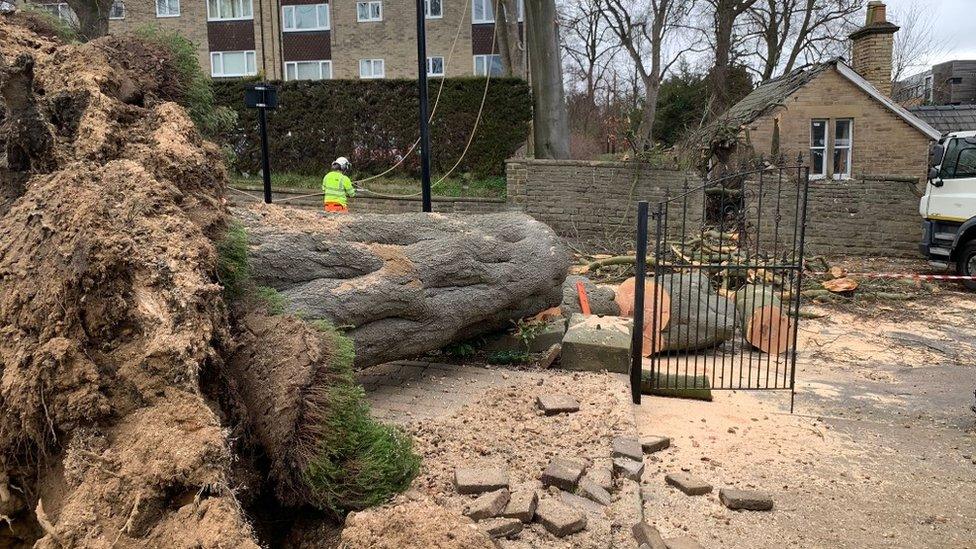
The man was injured when a beech tree fell across Endcliffe Vale Road and damaged a nearby property
A man has been seriously injured by a fallen tree as Storm Otto battered Yorkshire.
The man in his 50s was taken to hospital after the tree was blown down on Endcliffe Vale Road in Sheffield at about 08:50 GMT, police said.
A nearby property was also damaged and structural engineers are at the scene while the road remains shut.
Winds of up to 70mph caused widespread travel disruption and thousands of homes were left without power.
Northern Powergrid said more than 2,500 households were experiencing power cuts, with outages at nearly 1,500 homes in North Yorkshire, about 550 properties in West Yorkshire and more than 200 in South Yorkshire.
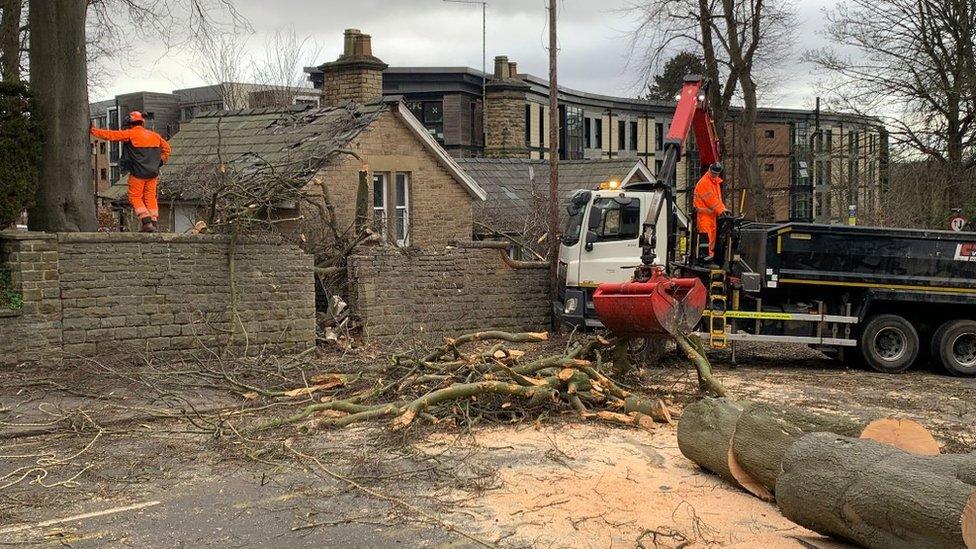
Endcliffe Vale Road in Sheffield was closed while the area was cleared
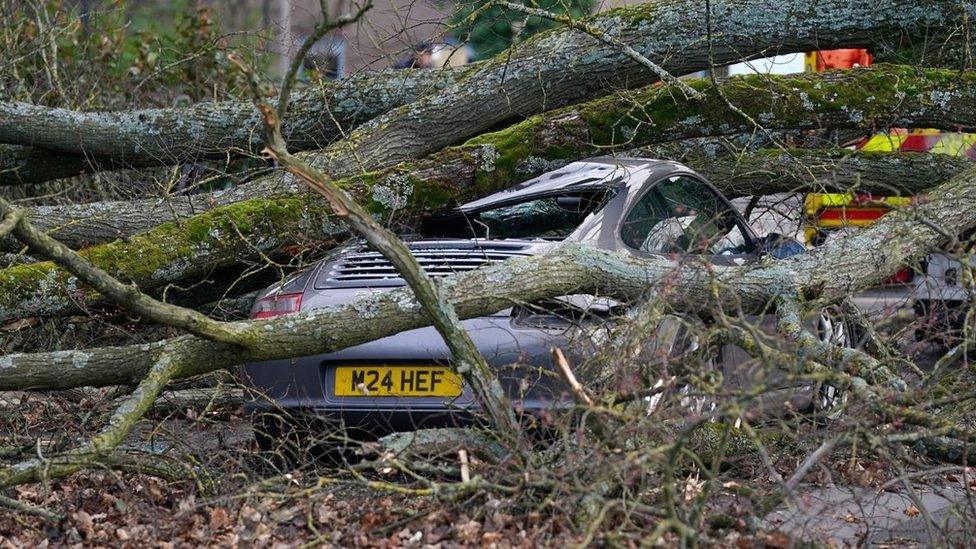
Trees were blown down across Yorkshire including one which crushed a Porsche 911 car in Granby Road, Harrogate
Train operator Northern said there were severe problems, external, with a number of services in West and North Yorkshire cancelled or delayed on Friday morning.
The A1(M) in North Yorkshire was closed between junctions 48 and 49 , externalbecause of an overturned lorry but reopened at about 13:00.
National Highways said the road was also closed in both directions to high-sided vehicles between junctions 47 near York and 56 near Darlington because of strong winds.
The Met Office issued a yellow warning, external of strong winds which remained in place until 14:00 GMT.
Many trees were blown down across the region, including one which partially blocked Scott Hall Road, one of the main routes into Leeds city centre.
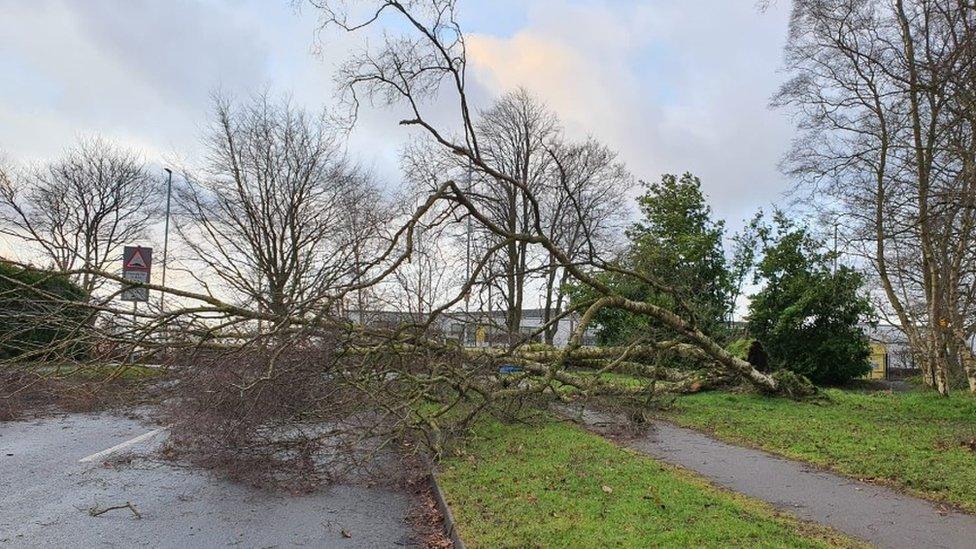
The A61 Scott Hall Road in Leeds was blocked for a while after a tree fell across the northbound carriageway

A trampoline was blown on to a conservatory roof in Thorner near Leeds
Three trees fell down close to homes and a community centre on Shadwell Lane in Leeds.
Iain Farquharson said he was woken up by the sound of the wind and then heard a "crash" as one tree was blown over followed by the other two soon afterwards.
"I turned my back and heard a very gentle thud, one minute they were there, the next they weren't," he said.
"No-one was hurt, that's been a miracle, and they missed our house and our neighbours' house."
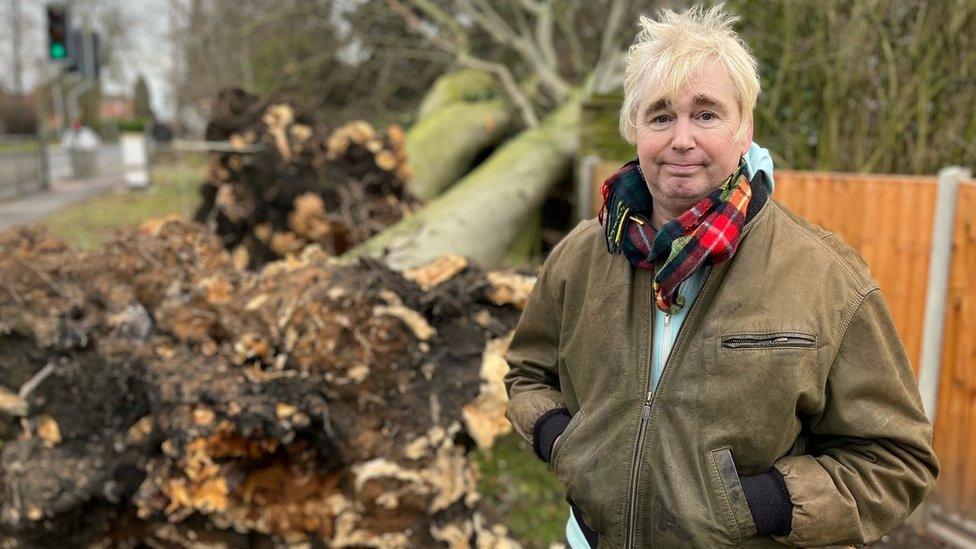
Iain Farquharson said it was a miracle that nobody was hurt when three trees fell down on Shadwell Lane in Leeds
Several planes were unable to land at Leeds Bradford Airport because of the high winds, with some flights being diverted to Liverpool.
Network Rail said teams were responding to debris blown onto the tracks across the region's railways.
Allow X content?
This article contains content provided by X. We ask for your permission before anything is loaded, as they may be using cookies and other technologies. You may want to read X’s cookie policy, external and privacy policy, external before accepting. To view this content choose ‘accept and continue’.
At Leeds railway station, plastic sheeting was blown onto overhead lines, causing service disruption.
Motorists were also warned of difficult driving conditions with National Highways urging people to only travel if necessary.
In East Yorkshire, the speed limit on the Humber Bridge was reduced to 30mph (48kph) because of high winds.
Allow X content?
This article contains content provided by X. We ask for your permission before anything is loaded, as they may be using cookies and other technologies. You may want to read X’s cookie policy, external and privacy policy, external before accepting. To view this content choose ‘accept and continue’.
Meanwhile, North Yorkshire Police said it had seen a three-fold increase in the number of 999 calls it normally received on Friday morning.
The force said Harrogate was one of the worst-affected areas, with 20 reports of fallen trees in two hours.
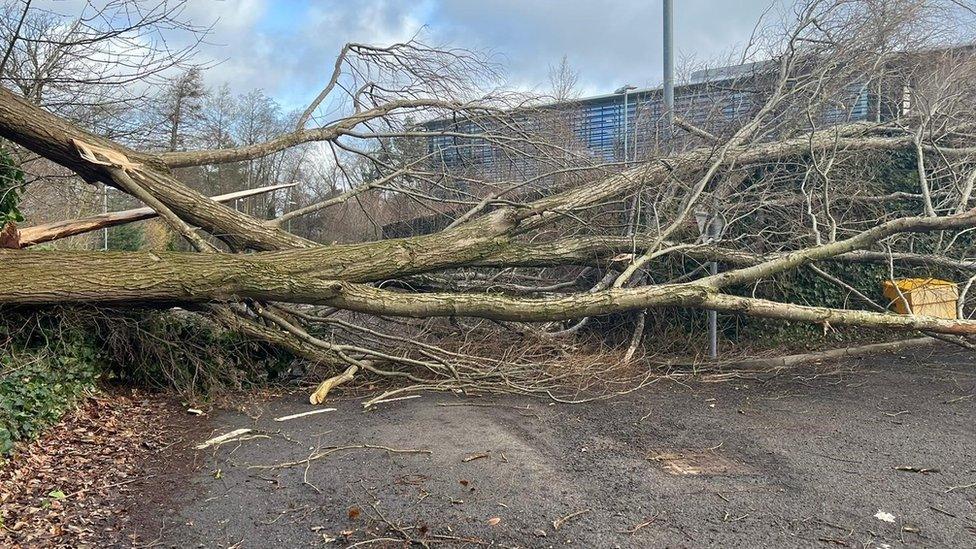
In Harrogate, there were 20 reports of fallen trees in two hours, police said
The A1(M) in North Yorkshire was also badly affected, with five incidents involving heavy goods vehicles, the force said.
Three had overturned, one had lost its roof and one had lost its load, a spokesperson added.
Insp Ian McNiff, North Yorkshire Police's force incident manager, said: "We've seen a significant increase in calls this morning following Storm Otto and our staff have been working hard to answer these calls as quick as possible,
"We're not able to attend every incident and we do need to prioritise resources to those most in need."
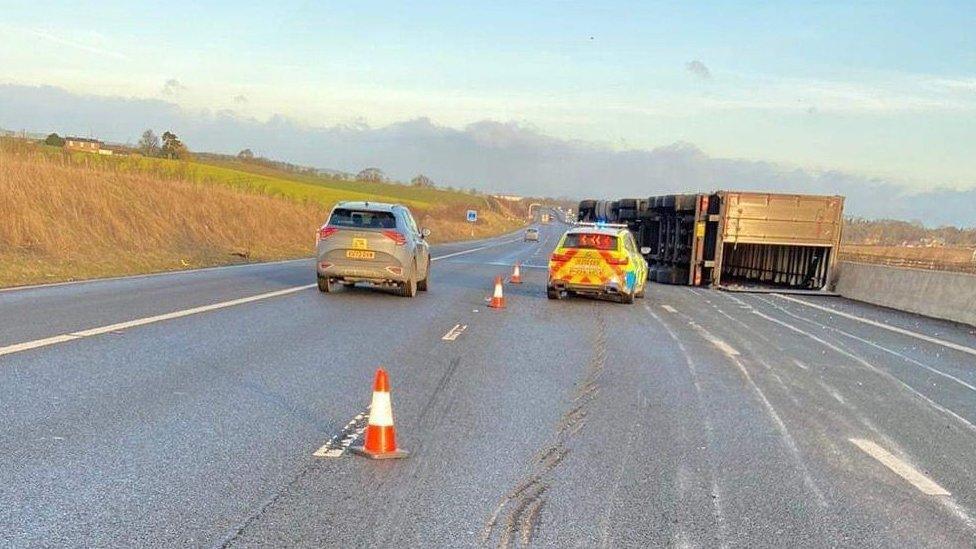
The North Yorkshire force also dealt with a number of incidents involving lorries on the A1(M)
The Met Office warning, in force for much of the region, stated there was a "small chance of injuries and danger to life from flying debris" along with a risk of damage to buildings, such as tiles blown from roofs.
It also said there was the likelihood of large waves, especially along the North Sea coast.
The storm was named Otto by the Danish Met Office. The UK Met Office has adopted the same name.
It is the first named storm to hit the UK since Franklin last February.
The Met Office's season for named storms runs from September to September, and the names are given to raise awareness of severe weather.

Follow BBC Yorkshire on Facebook, external, Twitter, external and Instagram, external. Send your story ideas to yorkslincs.news@bbc.co.uk, external.


Have you been affected by Storm Otto? Please email us: haveyoursay@bbc.co.uk, external.
Please include a contact number if you are willing to speak to a BBC journalist. You can also get in touch in the following ways:
WhatsApp: +44 7756 165803, external
Tweet: @BBC_HaveYourSay, external
Or fill out the form below
Please read our terms & conditions and privacy policy
If you are reading this page and can't see the form you will need to visit the mobile version of the BBC website to submit your question or comment or you can email us at HaveYourSay@bbc.co.uk, external. Please include your name, age and location with any submission.

Related topics
- Published17 February 2023
